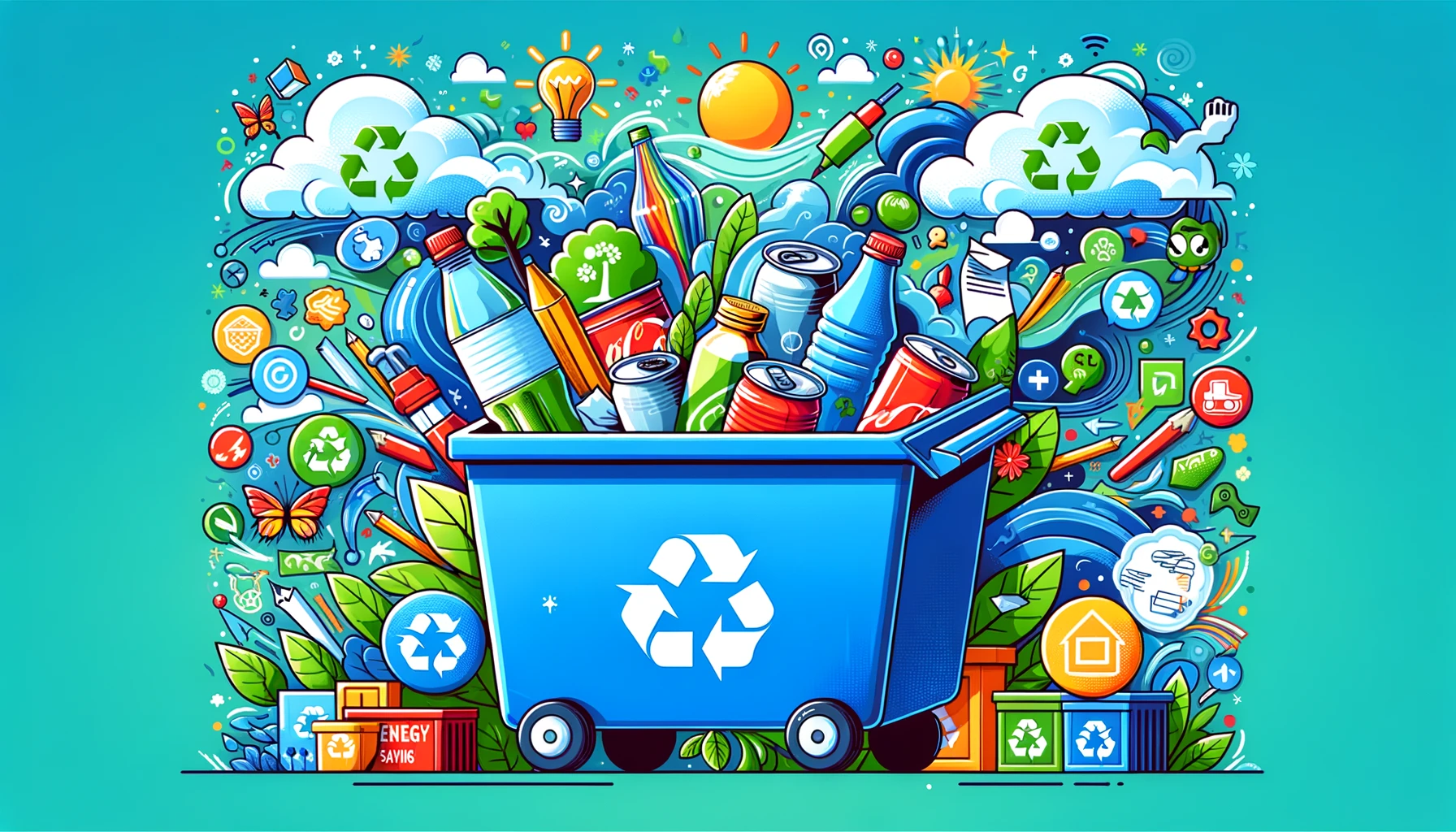Recycling, the mystical process where we throw our soda cans into a blue bin and then feel really good about saving the world. You know, because recycling alone is absolutely going to pull our planet back from the brink. Not that reducing consumption or reusing stuff is important, right? No, no. All we need is that trusty blue bin. And magic. But mostly the bin.
Recycling: The Top-Level Gist
For those of you who’ve been living under a rock (which, by the way, is totally recyclable), let me break down this ultra-complicated process for you. You drink a soda, toss the can in a blue bin, and bam! That can transforms into a shiny new bicycle or perhaps the Eiffel Tower. The specifics are a bit fuzzy, but trust me, recycling is practically wizardry.
Why Recycling is “Totally Overrated”
1. Save Energy? Who Needs That!
So, the first reason to recycle is apparently to save energy. Ha! Because, you know, the planet totally has an unlimited supply of energy. Fossil fuels? They grow on trees. Actually, wait, no, they’re made from dead trees (and a bunch of other prehistoric stuff), but you get the gist. Why would anyone want to save energy when they can just watch reruns of their favorite TV shows with all the lights on in their house?
But, for the sake of argument, let’s say saving energy might be a good idea. Recycling does reduce the need to extract and process raw materials, which, shockingly, uses up a lot of energy. And since energy production is a leading source of greenhouse gas emissions, you could say recycling helps fight climate change. But who’s worried about a warmer planet anyway? I mean, I’ve always wanted to go swimming in Antarctica!
2. Reduce Landfills? But They’re Such Tourist Attractions!
Why would we want to reduce the amount of waste in landfills? They’re like the Grand Canyons of garbage! Majestic mounds of discarded dreams. By recycling, we’re effectively robbing future generations of the chance to visit these modern wonders. I mean, who needs the Eiffel Tower or the Great Wall when you could have Mount Trashmore in your own backyard?
Recycling keeps waste out of landfills, reducing the need for these beautiful, methane-releasing, groundwater-polluting attractions. But hey, who cares about clean water, right?
3. Protect Natural Resources? Pfft, We’ve Got Plenty!
Sure, the Earth has been around for about 4.5 billion years, but I’m positive we won’t run out of trees, minerals, or water in the next 50. Why conserve when you can consume? But on the off chance that you care about leaving some resources for your grandkids, recycling does help. For instance, recycling a single aluminum can saves enough energy to run a TV for three hours. But, you know, I’m sure we could also just power our TVs with unicorn dreams.
4. Jobs? Who Needs Them!
Recycling isn’t just good for the planet; it’s good for the economy. But let’s ignore the fact that recycling creates more jobs than landfilling or incineration. I mean, who wants a job turning old junk into new treasures when they can just swim in their Scrooge McDuck-style vaults of money?
Jokes aside, recycling industries employ a significant number of people. More recycling means more jobs. Simple math. But then again, who said math was ever important?
5. Support Endangered Species? But Unicorns are Better!
Okay, let’s talk about the other creatures who share this planet with us. Recycling helps protect their habitats, which are often destroyed to mine new raw materials. But hey, who needs tigers, pandas, and polar bears when we can just hope for unicorns and dragons to come into existence?
On a very, very unrelated note, recycling paper and cardboard can save trees, which, in turn, can save the habitats of countless species. But let’s not bother with that when we could potentially have magical creatures, right?
6. Boost the Economy? But Hidden Treasure Sounds More Fun!
Besides the jobs recycling creates, it also boosts the economy in other ways. When materials like metal, plastic, and paper are recycled, they can be sold, generating income. Plus, recycled materials can be cheaper than new ones, making products more affordable. But then again, why stimulate the economy when we can all just go on a quest for hidden pirate treasure? Seems equally realistic.
7. Lead by Example? Nah, Being a Hermit is Way Cooler.
If you recycle, you might inspire others to do the same. But leading by example? That’s too mainstream. I’m sure living like a hermit in a cave and having zero influence on the outside world is just as fulfilling.
However, if you do decide that being a positive influence in your community sounds appealing (strange, I know), then showing your commitment to recycling can make a big difference. Your actions could inspire your neighbors, friends, or even just that one nosy person who’s always peeping through their window.
Bringing It All Together (With a Slightly More Serious Note)
So, while we’ve had our fun poking at the concept, let’s ground ourselves for a brief moment. Recycling is, in truth, a significant action towards a more sustainable future. It’s a simple step that when combined with the efforts of people worldwide, can bring about profound change.
That being said, recycling is just one piece of the puzzle. It’s essential to remember the first two Rs: Reduce and Reuse. These three combined will truly set us on a path towards a greener, healthier planet.
In conclusion, let’s keep chucking our recyclables in the magic blue bin, but let’s also remember to buy less, repurpose what we have, and continue to humorously champion for a world where penguins can waddle happily, and Mother Nature can nod approvingly at our collective antics. Because, in the end, the joke’s on us if we don’t take care of our only home.
Practical Tips on Recycling
- Learn What’s Recyclable: Not all materials are treated equally in the recycling world. Take the time to learn what your local recycling program accepts and what it doesn’t. This knowledge prevents contamination of recycling streams, making the entire process more efficient.
- Clean Your Recyclables: A little rinse can go a long way. Cleaning your recyclables, like jars and cans, ensures they don’t contaminate other materials, especially paper. This small step significantly increases the likelihood of your items being recycled.
- Don’t Wishcycle: Wishcycling is tossing something in the recycling bin and hoping it’s recyclable. This can do more harm than good. Items like greasy pizza boxes, plastic bags, and certain types of glass can disrupt the recycling process.
- Reduce First, Recycle Second: Emphasize that reducing consumption is even more crucial than recycling. Encourage readers to opt for products with less packaging, buy in bulk, and choose reusable over disposable whenever possible.
- Repurpose and Upcycle: Before tossing something in the recycling bin, consider if it can be repurposed. Upcycling transforms waste materials into new products of better quality or environmental value.
- Recycle E-Waste Properly: Electronics should never go in your regular recycling bin. Encourage readers to find local e-waste recycling programs for their old gadgets.
- Compost Organic Waste: Remind readers that organic waste like food scraps and yard waste can be composted, turning waste into valuable fertilizer.
- Educate Others: Share your knowledge about recycling with friends and family. Education is key to improving recycling rates and efficiency.
- Support Brands That Use Recycled Materials: Encourage the support of companies that use recycled materials in their products. This creates a market for recycled goods, making the process more sustainable.
- Participate in Community Clean-Up Events: Join or organize local clean-up events. This not only helps the environment but also raises awareness about the importance of waste management.
Frequently Asked Questions (FAQs) about Recycling
Rinsing recyclables, like jars and cans, removes food residue and other contaminants. This step is crucial to prevent the contamination of other recyclables, especially paper, and ensures that more materials can be successfully recycled.
‘Wishcycling’ is the act of placing items in the recycling bin in the hope that they are recyclable, even if they aren’t. This can lead to contamination of the recycling stream, making the recycling process less efficient and potentially ruining other recyclable materials.
Pizza boxes can be recycled if they are not contaminated with grease or food. If the bottom part of the box is greasy, tear it off and dispose of it with regular waste, while recycling the clean parts.
Reducing consumption lessens the demand for resources and energy used in producing new products. While recycling is beneficial, it’s more effective to first reduce the amount of waste we generate.
E-waste should never be thrown in regular recycling bins. Instead, look for local e-waste recycling programs or drop-off events, as electronics need to be processed separately due to their hazardous components and valuable materials.
Absolutely. Buying products made from recycled materials supports the recycling industry, reduces the need for new raw materials, and often saves energy and resources.
The recyclability of plastics varies based on your local recycling program. Generally, plastics marked with recycling codes #1 (PET) and #2 (HDPE) are widely accepted. Check with your local facility for specifics.
Recycling creates jobs in collection, processing, and manufacturing. It also saves money on raw materials and energy, contributing to a more efficient and sustainable economy.
No, materials soiled with food cannot be recycled as they contaminate the recycling stream. Compost them instead, if possible.
You can participate in or organize community clean-up events, educate others about proper recycling practices, and advocate for better recycling facilities and policies in your area.



